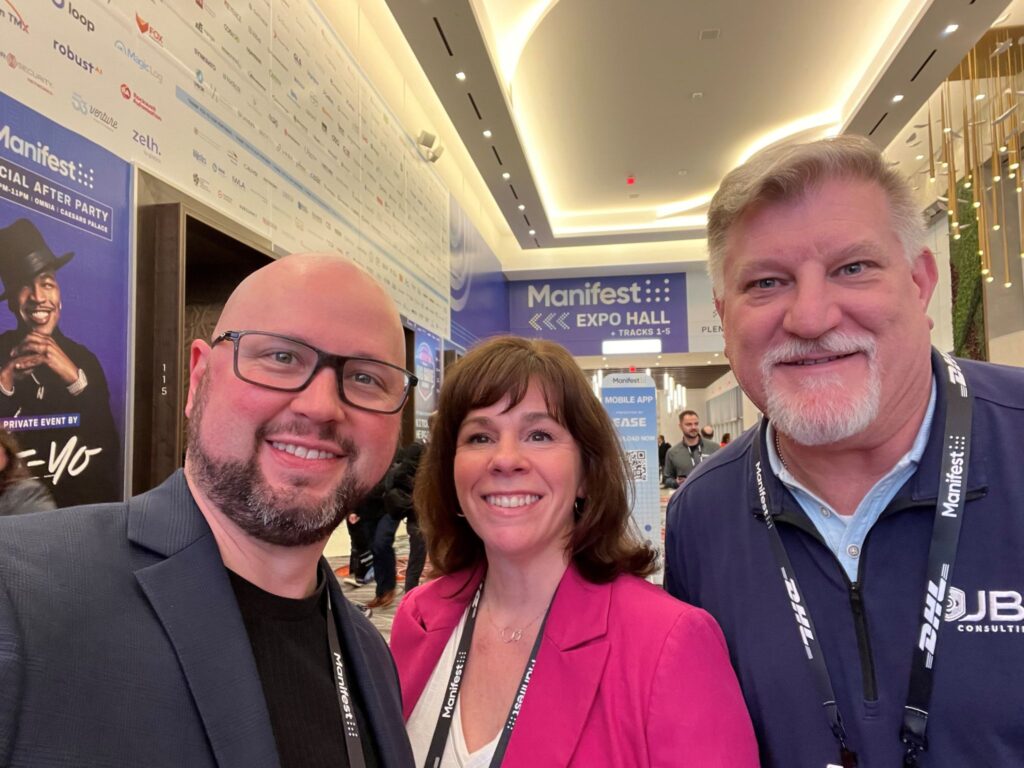Recently, the JBF Consulting team, including Chris Doersen, Tony Wayda and Mary Wayt, attended Manifest 2024 in Las Vegas. Here are the key insights that captured our attention.

Chris, Mary and Tony at Manifest 2024
AI's Impact in Logistics
At Manifest 2024 in Las Vegas, two words echoed across the conference, repeated by panel speakers, companies, and attendees: data and trust. These are the two primary enablers that artificial intelligence (AI), machine learning (ML), and large language models (LLM) need to leverage before achieving a breakthrough in the supply chain and logistics space.
Panelists addressed a variety of topics within the industry, and nearly every speaker touted the need for a strong foundation of clean and complete data, combined with the willingness to share that information across groups and platforms. This places a premium on building the necessary trust among large groups of stakeholders to facilitate equitable access to aggregate data—and the insights that AI can generate using it.
Fortunately, there is already a wave of AI models that will help rectify lingering issues of data quality and completeness. With so many more ways of generating data in today’s supply chain, AI is actively assessing and improving overall data accuracy, identify missing data elements—or entire records—and ultimately providing rapid feedback that traditionally took analysts days or even weeks to compile.
"AI is actively assessing and improving overall data accuracy, identify missing data elements—or entire records—and ultimately providing rapid feedback that traditionally took analysts days or even weeks to compile."
Other practical available AI uses were highlighted during the conference: improved coding speed, building systems integrations more quickly, easier interfaces to training documentation, and improved voice query capabilities for warehouse and in-vehicle applications. The underlying technologies enabling these are not unique to our industry, which is likely why these benefits are materializing first.
Put simply, AI technology that can be used across multiple industries is inherently more valuable, thus receiving larger initial investments and advancing more quickly.
In one session, Christopher Plaat, GM & SVP at Blackberry Radar, asked a key question that every shipper and carrier should be asking right now: “How do I operationalize my data?”
To answer that question, it will be critical that companies leverage the new wave of AI technology to continuously improve their data while simultaneously strengthening relationships with their partners—both external and internal—and bolstering the age-old business currency of trust.
Key Takeaways
- Data and Trust: These are fundamental to leveraging AI, ML, and LLMs in the supply chain and logistics industry. Emphasized at Manifest 2024, both elements are crucial for the next leap forward.
- Foundation of Clean Data: Speakers highlighted the importance of clean, complete data and the need for open sharing across platforms and groups to build trust and ensure equitable access to insights generated by AI.
- AI’s Role in Data Quality: AI technologies are being developed to address data quality and completeness issues, enhancing accuracy, identifying gaps, and providing faster analysis than traditional methods.
- Practical AI Applications: Demonstrated uses include speeding up coding, facilitating system integrations, simplifying training documentation interfaces, and improving voice query capabilities, with benefits first seen in industries where AI technologies are universally applicable.
- Operationalizing Data: A critical question raised involves the use of AI to enhance data utility and strengthen relationships within the industry, reinforcing the value of trust in business partnerships.
Bottom Line
The pace of change is accelerating. AI is yet another catalyst, but still a tool. We are pleased to hear the use cases coming out of the Manifest 2024 conference appear to be more “pragmatic” and less “glam.” Nobody wants to talk about data quality (but us geeks), but it is clearly the foundation of systems integrity and needs to be inspected before launching any initiative.
"Put simply, AI technology that can be used across multiple industries is inherently more valuable, thus receiving larger initial investments and advancing more quickly."
About the Author
Chris Doersen is an Executive Principal overseeing the Solutions Team at JBF Consulting. Chris’ talent is in leading diverse teams to create valuable and implementable solutions for complex supply chain networks.
He has 21+ years of experience working with large inbound and outbound supply chains in North America, Europe, and Brazil across a multitude of industries, including Automotive, Pharmaceutical, Retail, Consumer Packaged Goods, Food & Beverage, Appliance, Metals, and more. His functional expertise is in logistics management systems, network design tools, advanced transportation optimization, and continuous improvement processes.
In addition to being a certified Project Management Professional (PMP) and a Six Sigma Green Belt, Chris earned his BS in Marketing from The Ohio State University.
About JBF Consulting
Since 2003, we’ve been helping shippers of all sizes and across many industries select, implement and squeeze as much value as possible out of their logistics systems. We speak your language — not consultant-speak – and we get to know you. Our leadership team has over 100 years of logistics and TMS implementation experience. Because we operate in a niche — we’re not all things to all people — our team members have a very specialized skill set: logistics operations experience + transportation technology + communication and problem-solving skills + a bunch of other cool stuff.

